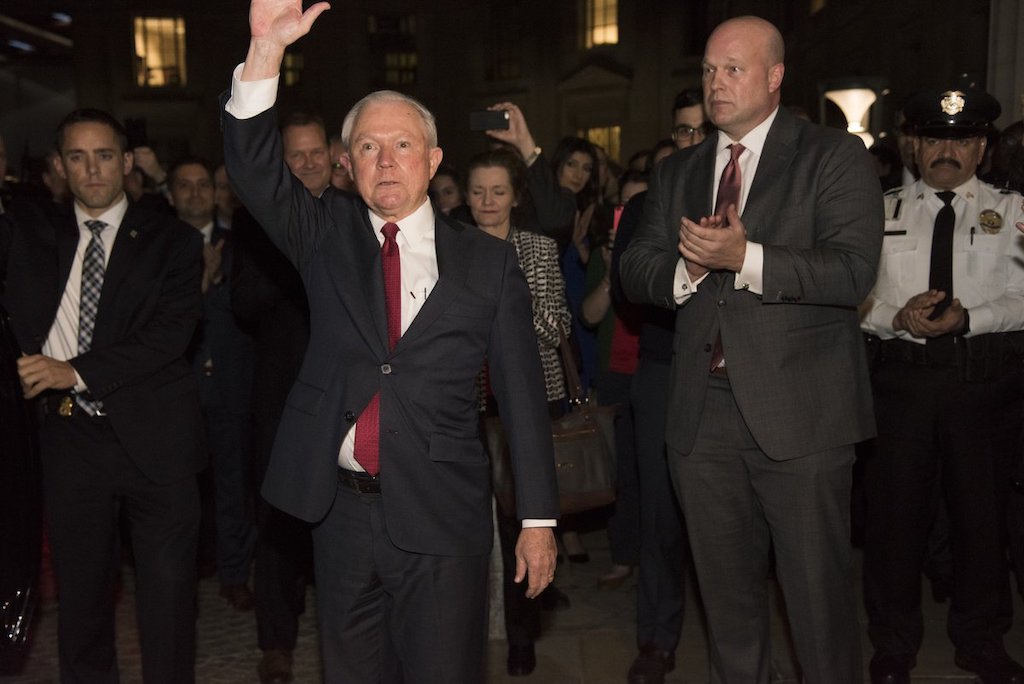Whitaker’s Appointment and Broader Risks at the Justice Department
Largely irrelevant to President Trump were the potentially vast problems Whitaker’s appointment poses to the Justice Department’s regular law enforcement and national security activities.

Published by The Lawfare Institute
in Cooperation With

Most of the concerns over Matthew Whitaker, recently tweeted into office as acting attorney general, have centered on what he might do to the Mueller investigation. In this brief post, I consider some of the potentially broader effects on the Department of Justice, starting with the Foreign Intelligence Surveillance Act and expanding outward. For President Trump, who I believe typically views the world through the straw-sized aperture of his own self-interest, Whitaker’s loyalty, demonstrated through often-expressed hostility toward Robert Mueller’s investigation, is an affirmative reason to appoint him. Largely irrelevant to the president, I believe, are any risks the appointment poses for the Justice Department’s other activities in law enforcement and national security. For those of us who take a wider view, however, what are those risks? And what do they tell us about whether this appointment was sensible?
1. To begin with a question I have been asked repeatedly, can Whitaker approve FISA applications? The statute requires traditional FISA applications to be approved by “the Attorney General”—see, for example, 50 U.S.C. § 1804(a)—a term defined in § 1801(g) to “mean[] the Attorney General of the United States (or Acting Attorney General), the Deputy Attorney General, or, upon the designation of the Attorney General, the Assistant Attorney General designated as the Assistant Attorney General for National Security under section 507A of title 28.” (Absent valid approval, any evidence resulting from the authorized surveillance might be suppressed on motion by an aggrieved party, preventing it from being used in trial.) Many other FISA actions similarly require the approval of or action by the attorney general, including annual certifications under 50 U.S.C. § 1881a, the FISA Amendments Act, where the same definition of “Attorney General” applies under 50 U.S.C. § 1881. As far as FISA’s plain language is concerned, therefore, the “Acting Attorney General” can approve FISAs.
The statute does not say anything about who may or may not be the “Acting Attorney General.” And the legislative history of FISA suggests that the statute was not intended to independently limit who may or may not be the “Acting Attorney General.” In 1978, Congress explained that the “Deputy Attorney General is appropriate” to include within the statutory definition of “Attorney General” because, “as the second-ranking official in the Justice Department, he would most often be the Acting Attorney General in the Attorney General’s absence.”
Notably, in 1978, Congress rejected the government’s proposal, based on a “need to lessen the administrative burden on the Attorney General,” to include an assistant attorney general in the definition of “Attorney General.” Based on “the assurance of Attorney General Bell . . . that he would personally continue to approve applications under [FISA] until standards of review have been well established,” Congress enacted “a modified version of the Administration’s proposal. It provides authority for the Attorney General (or the Acting Attorney General) or the Deputy Attorney General — rather than a specially designated Assistant Attorney General — to approve applications.” The volume of FISA work has grown since 1978, and particularly since 2001, and Congress later expanded the definition of “Attorney General” to include the assistant attorney general for national security in the USA Patriot Improvement and Reauthorization Act of 2005.
At any rate, by saying in 1978 that the deputy attorney general will “most often” be the acting attorney general, Congress implicitly left room for another official to be the acting attorney general. Accordingly, FISA is essentially agnostic about who is or is not the “Acting Attorney General” so long as they are duly appointed consistent with the law. I am reasonably confident that this will be Justice Department’s conclusion.
2. Marty Lederman has done a great job explaining the various early arguments, pro and con, as to whether Whitaker is, as a matter of statutory or constitutional law, duly appointed as the acting attorney general. He identifies two main reasons why Whitaker’s appointment may be unlawful: a statutory argument that the president improperly relied on the Federal Vacancies Reform Act (FVRA), 5 U.S.C. § 3345, when succession should instead be governed by the Department of Justice Succession Act, 28 U.S.C. § 508; and a constitutional argument that Whitaker’s appointment violates the Appointments Clause because he does not currently hold any position for which he was confirmed by the Senate. The Justice Department's Office of Legal Counsel (OLC) has released a 20-page memo arguing that there is no statutory or constitutional problem with the appointment. Larry Tribe and John Yoo, not often in agreement, have recently written that it is unconstitutional. For now, at least, I don’t have anything to add to these various explanations and arguments on the merits of the appointment. It is enough to say that there are serious scholars on both sides of the issues.
Even considering OLC’s long memo, however, what follows from Lederman’s summary is that the Justice Department’s National Security Division should not, unless absolutely necessary, bring any FISA applications to Whitaker. If there is even a 1 percent chance of a problem with Whitaker’s appointment that might make FISA applications vulnerable to challenge, they should stick to Rod Rosenstein and/or John Demers, the deputy attorney general and acting attorney general for national security, who are unquestionably able to approve the FISAs (assuming Demers has been properly designated). Those two officials are also surely far more sophisticated about FISA than is Whitaker (as I have pointed out, he has said that Marbury v. Madison was wrongly decided). Even if the risk of invalidation with respect to an application signed by Whitaker is low-probability, it could be very high-consequence, and it is wise to avoid such risks whenever possible.
3. It may be, however, that the risk is broader than something as direct and discrete as a FISA application signed by Whittaker. One case frequently cited against the legitimacy of Whitaker’s appointment is NLRB v. S.W. General, Inc., in which the Supreme Court rejected President Obama’s appointment of the acting general counsel of the National Labor Relations Board (NLRB) because it violated the FVRA. Justice Clarence Thomas concurred to explain that “the Appointments Clause” of the Constitution also “likely prohibited [the] appointment” because the acting general counsel, a principal officer, was not confirmed by the Senate, along with other reasons (including that he had held office for three years). This view has obvious implications for Whitaker.
The Supreme Court did not address the remedy for the statutory appointments violation that it found because the NLRB (which lost below) did not raise the issue in its petition for certiorari. The underlying opinion by the U.S. Court of Appeals for the D.C. Circuit, however, did address remedies, as it ultimately voided an NLRB enforcement action concerning unfair labor practices because the complaint over those actions was brought while the acting general counsel was in office in violation of the FVRA. The reasoning that led the D.C. Circuit to this conclusion could present major problems for the Justice Department if it faces similar challenges to its actions due to Whitaker’s potentially unlawful appointment.
The FVRA prescribes a strong remedy for most violations of its requirements: There is a general rule that, as the Supreme Court explained, “actions taken in violation of the FVRA are void ab initio”—meaning that they “shall have no force and effect” and “may not be ratified” after the fact. But the statute exempts from that remedy “the General Counsel of the National Labor Relations Board,” as the D.C. Circuit noted. The labor board argued that this made the acting general counsel’s actions merely “voidable, not void,” and presented two arguments as to why the actions should not be voided—arguments similar to those that the Justice Department might advance if Whitaker’s appointment were found to be invalid. (None of the prevailing theories against Whitaker’s appointment alleges that he was appointed in violation of the FVRA itself.) The D.C. Circuit assumed without deciding that the NLRB was correct on the effect of the FVRA exemption but ultimately rejected both of its arguments as to why the complaint of unfair labor practices should not be voided.
The D.C. Circuit rejected the NLRB’s reliance on the “de facto officer” doctrine, which, as its name suggests, is a legal rule that validates exercises of apparent authority even in the absence of actual authority. Although the doctrine has “feudal” origins, in its current form it gives way when the complaining party brings a timely objection to the officer’s status and the agency or department involved has reasonable notice of the claimed defect. The court found it sufficient to satisfy those requirements that the company that was the subject of the unfair labor practices complaint, known as Southwest, had raised the appointment issue as a defense before the administrative law judge and again before the NLRB itself. (Other plaintiffs who did not timely raise such objections have not been as fortunate.) Whitaker’s appointment, however, has generated huge publicity; OLC’s memo reflects the Justice Department’s awareness of the legal challenges; and many litigants are going to raise the issue in order to preserve it for further review. The de facto officer doctrine is therefore unlikely to solve the Justice Department’s problems if Whitaker’s appointment is indeed improper.
The D.C. Circuit also rejected the NLRB’s claim that the acting general counsel’s improper appointment was harmless error. Although the disputed complaint had issued during the tenure of the acting general counsel, the labor board itself later adopted the recommended order of the administrative law judge’s finding against Southwest based on the complaint. The NLRB therefore argued that the FVRA error was harmless by analogy to prior decisions finding that certain errors in a criminal indictment may be rendered harmless by a subsequent jury verdict of guilt.
The court rejected the analogy, noting precedent that “issues of separation of powers are structural errors that do not require a showing of prejudice because it will often be difficult or impossible for someone subject to a wrongly designed scheme to show that the design—the structure—played a causal role in his loss.” The court explained that in such cases, “Demand for a clear causal link to a party’s harm would frustrate the prophylactic goal of the separation of powers — i.e., establishing high walls and clear distinctions because low walls and vague distinctions will not be judicially defensible in the heat of interbranch conflict.” If a reviewing court finds Whitaker’s appointment improper and takes that approach to the scope of the remedy, the Justice Department may be in big trouble.
Ultimately, the D.C. Circuit did not hold that the appointment error in S.W. General was structural but simply rejected the claim that it was harmless, refusing to accept the NLRB’s ratification argument. The court’s reasoning in support of this conclusion is particularly notable in light of Whitaker’s appointment and the responsibilities he exercises as acting attorney general (internal quotations and citations omitted):
The NLRB General Counsel is statutorily independent from the Board, and he has final authority over the issuance of ULP complaints. He essentially exercises prosecutorial discretion: he need not issue a complaint even if he believes a ULP was committed. Moreover, the General Counsel sets the enforcement priorities for the NLRB and generally supervises its lawyers. During oral argument, the Board conceded that, if the General Counsel's office were vacant, the NLRB would not be issuing complaints. The Board nonetheless argued that, because the type of ULP charged against Southwest was not of substantial legal interest to [the] Acting General Counsel . . . that particular complaint did not require submission to the General Counsel’s Office for review beforehand. Southwest rightly points out, however, that a different General Counsel may have imposed different requirements and procedures during his tenure. Accordingly, notwithstanding the final Board order, we cannot be confident that the complaint against Southwest would have issued under an Acting General Counsel other than [the one improperly appointed by President Obama].
Much of this paragraph ought to be of concern to the Justice Department today. The unfair labor practices judgment was invalid, the D.C. Circuit found, because it was issued during the tenure of the improperly appointed acting general counsel. It did not matter that the general counsel did not personally review or approve the complaint, because he “essentially exercises prosecutorial discretion,” he “sets the enforcement priorities” for the agency and he “generally supervises its lawyers.” It was sufficient for the court that a different acting general counsel, properly appointed, might have reviewed and disapproved the complaint.
Interested litigants can be expected to argue that this analysis applies to actions taken during the tenure or pursuant to the authority of an improperly appointed acting attorney general, whether or not the acting attorney general was personally involved in the relevant Justice Department decision or action. (Litigants have tried similar tactics in the past regarding the actions of U.S. attorneys whom they argued were improperly appointed.) At least as much as the NLRB’s general counsel, the acting attorney general exercises prosecutorial discretion, sets enforcement priorities for his agency and generally supervises its lawyers. Indeed, as spelled out in 28 U.S.C. § 509, with very few exceptions, “[a]ll functions of other officers of the Department of Justice and all functions of agencies and employees of the Department of Justice are vested in the Attorney General.” (28 U.S.C. § § 516 and §533 contain similar provisions regarding the attorney general’s powers.) Whether or not Whitaker personally makes or takes a particular decision or action, therefore, some will say it is sufficient that a different attorney general, properly appointed, might have done so and reached the opposite decision. Smart litigants will also attempt wherever possible to provoke or trigger the personal involvement of the acting attorney general in their cases, in order to strengthen their claims for later.
Of course, if necessary, the Justice Department will respond that S.W. General is distinguishable and might also identify other arguments to limit the remedy for an improper appointment. One possible difference between S.W. General and Whitaker’s case concerns the statutory bases of power exercised by subordinates of the acting general counsel (under, for example, 29 U.S.C. §§ 153(d), 154) and the acting attorney general (under, for example, 28 U.S.C. §§ 503, 509-510 and 519). Certain subordinates of the attorney general are themselves statutorily charged with performing important functions in ways not expressly contingent on the attorney general and in ways that may be distinguishable from the distribution of authority within the NLRB. For example, as noted above, regardless of who is or is not the acting attorney general, the deputy attorney general is clearly authorized to sign FISA applications. See also 18 U.S.C. §§ 2516 (Wiretap Act), 2709(b) (ECPA National Security Letter). Exercises of these and other independent authorities might be insulated from any infirmities arising from Whitaker’s appointment, despite the acting attorney general’s supervisory authority. Perhaps that same logic would extend to actions by the assistant attorneys general, most of whom merely “assist the Attorney General” under 28 U.S.C. § 506—the assistant attorney general for national security has certain independent powers when designated by the president under 28 U.S.C. § 507A—or by the U.S. attorneys, who have the duty to “prosecute for all offenses against the United States” within their districts under 28 U.S.C. § 547(1), albeit subject to the attorney general’s plenary control.
Whatever distinctions exist between the lines of authority within the two agencies, the D.C. Circuit seems to have been able to imagine the huge abyss that a high-profile and improper Justice Department appointment might open. For that reason, I think, it was careful near the end of its analysis to note that its conclusion about the acting general counsel of the NLRB “does not control whether the ineligibility of an official with prosecutorial responsibilities in other contexts should be considered harmless.” More significant than the theoretical escape hatch created by that sentence, however, may be the recognition that the logic of the court’s opinion made it necessary.
My purpose here, of course, is not to assess authoritatively the legal arguments for and against the scope of the remedy for an improper appointment of Matthew Whitaker, any more than it is to assess authoritatively the arguments for and against his appointment in the first instance. Ultimately, if a court concludes some years from now that Whitaker was improperly appointed, I do not really believe that it will release all persons convicted or sentenced in federal court, dismiss all Justice Department civil judgments and invalidate all FISA surveillance conducted during those years. But what the D.C. Circuit’s decision and other authorities cited above may suggest is that the problems resulting from an acting attorney general’s improper appointment are not surgically limited to discrete acts like signing a FISA and that their outer limits may in fact be hard to discern. That, in turn, means that litigants may also try to get discovery into the inner workings and deliberations of the Justice Department to determine whether and to what extent Whitaker was personally involved in their cases (and as noted above, smart litigants will do whatever they can to provoke his involvement ahead of time to lay the groundwork for such claims).
4. This brings me back to the narrower point that I am trying to make here, concerning the absurdity of Whitaker’s appointment. I hope someone will point out why the concerns outlined above are overblown. But again, even if there is only a 1 percent (or lesser) chance of a really drastic remedy, then it is highly irresponsible to have appointed Whitaker. The FVRA and 28 U.S.C. § 508 together set a default rule that the deputy attorney general becomes acting attorney general, and the FVRA grants the president a fallback option to appoint another Senate-confirmed individual to fill the role. There is no need, therefore, to resort to the third option and appoint Whitaker, in an action that some legal scholars—including John Yoo, not known for supporting limits on presidential power—believe is unconstitutional. It is bad enough that Whitaker has expressed extreme views that make him a poor choice for the job; it is much worse that the appointment was plainly motivated by the president’s desire to limit an ongoing investigation in which he himself is a subject; and it is very revealing of the president’s selfishness (and/or carelessness) that, in his zeal to achieve that result, he might be putting in play a much broader set of the Justice Department’s significant activities.
I am very grateful for the timely and excellent input of Scott R. Anderson. Any remaining errors are mine alone.


.jpg?sfvrsn=8253205e_5)


